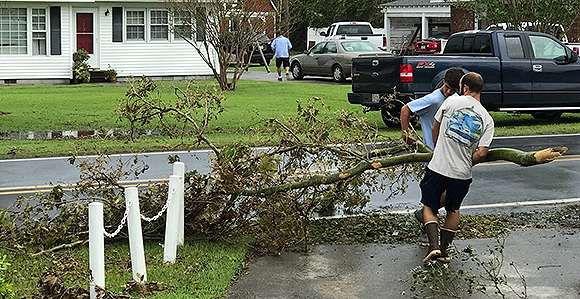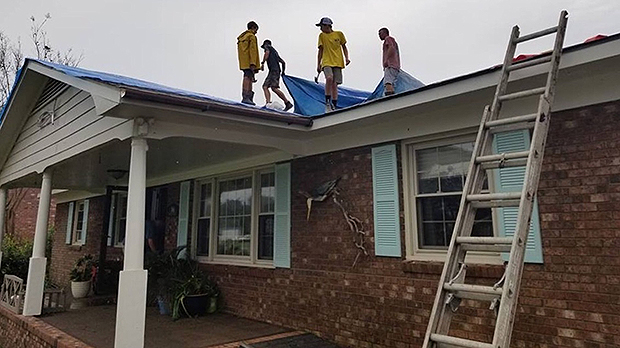Relief Society Serving “Minute by Minute” after Hurricane Hits North Carolina
Contributed By Jason Swensen, Church News associate editor

Volunteers help clear debris from a yard after Hurricane Florence hit North Carolina.
“Everyone is working together. We will help one another out and get through this.” —Kelly Taylor, Kinston North Carolina Stake Relief Society president
Duty called Karen Pierce, even from her Red Cross–provided cot in the hallway of an elementary school where she found shelter from Hurricane Florence’s deadly winds and rains.
The Hampstead Ward Relief Society president knew people were depending upon her. “So I pulled out my ward list of single sisters and started calling. … I wanted them to know that someone was thinking about them, that they were not alone.”
Pierce deflects any praise for her actions. She agrees the circumstances of her ministering were far from ideal. The storm displaced her for several days. She was sleeping and eating in a public shelter.
“But I felt very blessed,” she told the Church News. She was safe. She was dry. She could serve.
Local Relief Society leaders in North Carolina such as Pierce are playing key roles in making life a bit easier for fellow ward members and neighbors affected by Hurricane Florence. They will be relied upon even more in the coming days and weeks as Latter-day Saints recover from a catastrophe that has claimed more than 30 lives, forced legions into shelters, and left hundreds of thousands without power.
North Carolina Wilmington Stake President David Glew said the minute-to-minute efforts of Pierce and other “outstanding Relief Society leaders” in his besieged stake are ministering to many in need.
“It’s going to be a long recovery for our members, but their faith and resilience are amazingly strong,” he said.
Members of the Wilmington 2nd Ward have been staggered by a one-two punch from Florence and subsequent flooding. Relief Society president Rosemary Abrams said many families in her ward are experiencing significant flooding in their homes. But by combining forces, the priesthood and Relief Society members have been quick to respond.
“There’s a lot of service going on,” she said.

Members clad in yellow Helping Hands vests help repair the roof of a damaged home on Harkers Island, North Carolina, following Hurricane Florence. Local Relief Society and priesthood leaders have joined forces to minister to fellow members in need. Photo courtesy of Mariah Gillikin.
Relief Society sisters are delivering food and water to families and making frequent welfare visits. Abrams counts herself among the lucky homeowners in waterlogged Wilmington. She has plenty of food and water, and the damage to her property was limited to a few fallen trees.
“But there are other sisters who have eight inches of water in their homes or they have cars that won’t start because of the flooding,” she said.
Hurricane Florence may be history, but inundated waterways remain grave concerns. On Tuesday, 16 rivers across North Carolina were reportedly at major flood stage. The Cape Fear River near downtown Wilmington was expected to crest Tuesday.
“We’re going to have an awful lot of work to do” in the coming days and weeks, said Pierce.
Pam Meadows, the president of the Wilmington 1st Ward Relief Society, said the sisters and priesthood brethren in her ward are also working together to ensure fellow members have adequate food, water, and fuel.
Gasoline in the greater Wilmington area is a precious commodity with people needing to refuel their generators. “We still have a lot of people without electricity.”
It’s also hot in Wilmington, with high temperatures and high humidity forecast for the coming days. So many of the local Relief Society sisters with air-conditioned homes are hosting ward members who have lost power.
Meanwhile, Meadows and her fellow ward Relief Society sisters are anxious to pull on their yellow Helping Hands shirts and vests and serve anyone in their community in need.
Units such as the New Bern Ward and the Harkers Island Ward in the Kinston North Carolina Stake were severely impacted by Hurricane Florence. Stake Relief Society president Kelly Taylor said effective coordination between the sisters and the local priesthood leaders has allowed for effective service.
“Everyone is working together,” she said. “We will help one another out and get through this.”
Much of the most meaningful service, she added, is happening “one-on-one” across the Kinston stake as Relief Society sisters and others reach out to storm-weary families and provide them with, say, a warm meal or a warm shower.
Taylor has also been invigorated by cooperation stretching across religious congregations. Many Latter-day Saints in Greenville, for example, donated food, diapers, and others provisions to a local Christian church for distribution to those in need.
Meanwhile, floodwaters are invading the streets and homes of many in the city of Lumberton in southern North Carolina. Relief Society sisters there have utilized all available resources to keep tabs on one another. Some have shared water and flashlights. Another sister picked up a prescription for a woman who was staying in a shelter. Others have taken in entire families.
North Carolina Fayetteville Stake Relief Society president Janet Tart said it is humbling to watch the devotion and capacity of the women serving across her flood-damaged stake. From impacted units she hears accounts of individual ministering. Many of the sisters are dealing with their own challenges even as they claim opportunities to serve others.
“Most of them are right in the heart of [the disaster],” she said.
Tart agreed that coordination before, during, and after the hurricane between priesthood and Relief Society leaders at both the stake and ward level in the greater Fayetteville area is resulting in optimal service for those in need. “This has taken ministering to a whole new level.”
Hampstead Ward Relief Society president Karen Pierce was finally able to leave the shelter on Sunday. There are leaks in the roof of her home and she can only guess when electrical power will return to her community. But she continues to make welfare calls and, when the roads are traversable, she visits her Relief Society sisters.
“Everybody is trying to help each other out,” she said.
